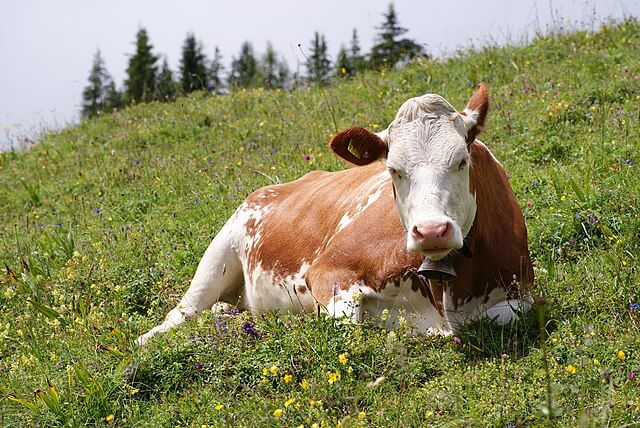
Sweden is investigating methane-reducing cow feed additives, such as seaweed, as part of government policy following recommendations from experts.
The Swedish Environmental Protection Agency’s report on reduced methane emissions acknowledges the rapid development in this field, highlighting various additives, with seaweed red algae and the chemical 3-nitrooxypropanol (3-NOP) among the noteworthy options.
The report underscores the potential of red algae, where the active substance is bromoform, claiming that daily feeding can potentially reduce methane emissions in meat animals by up to 90%.
However, the agency emphasises the need for more knowledge on cultivation and usage. Additionally, 3-NOP, approved for use in EU dairy cows since February 2022, is noted to reduce methane emissions by approximately 30% in dairy cows and 45% in meat cattle.
The positive effects of feeding seaweed were initially discovered by Australian researchers, working by inhibiting microorganisms in the cow’s first stomach from producing methane. While some feed additives exhibit significant potential, the report cautions about uncertainties regarding long-term effects and barriers to widespread adoption within production systems.
“More research and analysis is required both in terms of today’s marketed products and to develop alternative, future feed additives,” says the report.
Based on these findings, the study suggests that the government commissions further investigation into this area, involving the environmental agency and other authorities. This comprehensive inquiry should encompass socioeconomic impact, support mechanisms for farmers and the broader food chain, enhanced research, innovation initiatives, and increased collaboration with the industry.
The report identifies additional avenues for research, including the exploration of “climate-smart cows,” which involves investigating productivity enhancement and genetic variations between breeds concerning methane production. In 2021, Sweden’s agricultural sector contributed 3.6 million tonnes of CO2 equivalents of methane, with cattle digestion accounting for 2.9 million tonnes.
Emma Carlen, a climate analyst at the Swedish Environmental Protection Agency, said: “We believe that this [methane-reducing feed additives] can be a measure to reduce the methane from cattle in Sweden. We don’t have very many other measures that can have this affect within current production level. But we also believe it’s still quite new and there’s still more research to be done before we can really come in with a clear policy measure.”
Despite the potential benefits, the report acknowledges that the extra cost associated with implementing such measures poses a significant challenge for farmers. Therefore, there is a need to assess financial support mechanisms and other measures to facilitate the adoption of these methane-reducing feed additives.
Fredrik Åkerman, the CEO of Volta Greentech, a company developing a land-based seaweed factory for cattle feed in Sweden, emphasised the positive impact of their pilot projects, claiming an 80% reduction in daily methane emissions from cows.
Åkerman indicated a commitment to further pilot projects, including one at a commercial beef farm in the UK, with a focus on measuring methane emissions before and after introducing the feed, verified by third-party data.
“We have developed a strategy that makes cows burp and fart less methane emissions,” he said. “So the additive is included into the cow feed and we have now been able, in several commercial pilot projects, to reduce 80% of emissions per day that the cows emit, which is of course making a big positive impact on climate change and agriculture.”
Åkerman highlighted the importance of the report’s recommendations for the industry’s development. “To maintain profitability in the industry, it’s quite difficult for us to sell a product that costs money to reduce emissions if the incentives are not there. So the policy development is very important,” he added. “It has been lagging behind other industries.
——————————————————————————
At Natural World Fund, we are passionate about stopping the decline in our wildlife.
The decline in our wildlife is shocking and frightening. Without much more support, many of the animals we know and love will continue in their decline towards extinction.
When you help to restore a patch of degraded land through rewilding to forests, meadows, or wetlands, you have a massive impact on the biodiversity at a local level. You give animals a home and food that they otherwise would not have had, and it has a positive snowball effect on the food chain.
We are convinced that this is much better for the UK than growing lots of fast-growing coniferous trees, solely to remove carbon, that don’t actually help our animals to thrive.
This is why we stand for restoring nature in the UK through responsible rewilding. For us, it is the right thing to do. Let’s do what’s right for nature!
Donate today at https://naturalworldfund.com/ and join in the solution!

